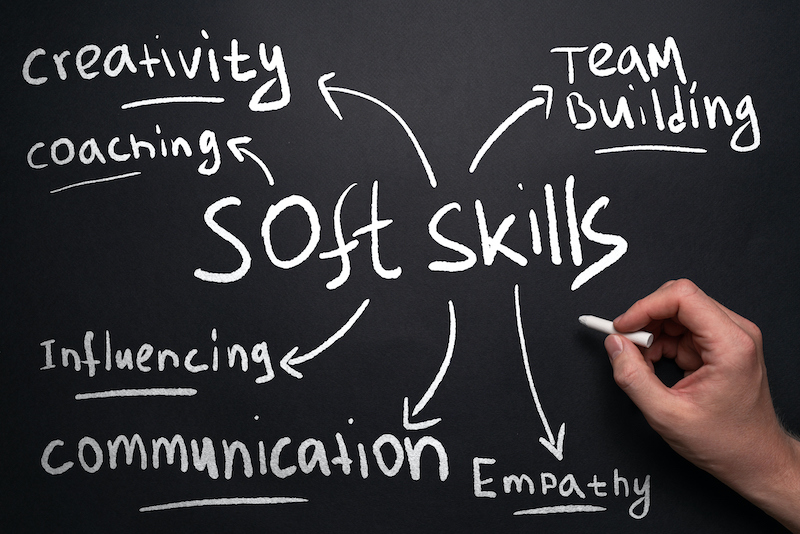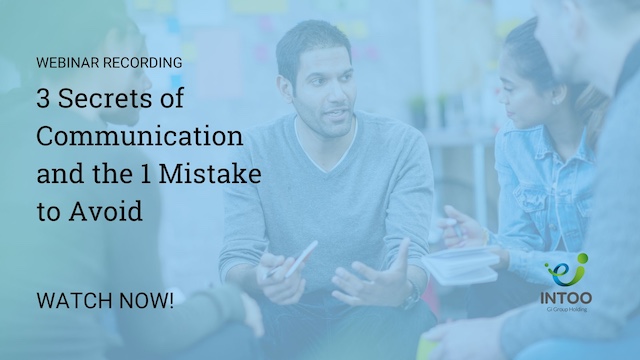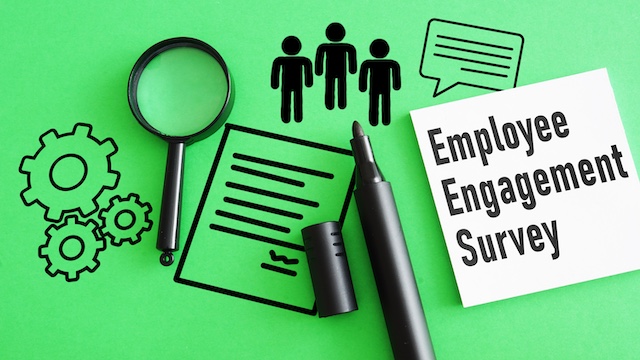When evaluating job applicants, employers should rely on more than a person’s industry experience. While job-specific skills are important, the applicant’s soft skills must also be considered. This guide will introduce you to soft skills and help show why they are highly desirable characteristics for your employees to possess.
What toxic traits might be lurking in your workplace? Read the report to learn how to build a more positive environment.
What Are Soft Skills?
Soft skills are non-technical abilities that positively impact employee performance and transcend industry-specific knowledge. For example, the “hard skill” of knowing how to code only applies to certain occupations, while understanding how to work in a team can be applied to any position. The latter is a “soft skill.” Soft skills generally consist of traits gained from social interactions and workplace experiences. Some examples include being:
- Innovative
- Confident
- Skilled at conflict resolution
- Emotionally intelligent
- Skilled at networking
While some employees may benefit from these skills naturally, others may require upskilling or reskilling to develop and hone these essential characteristics. Indeed, those who possess soft skills can be valuable assets for any organization, so it’s essential for employers to recognize these traits in their job applicants. Companies should also be encouraged to invest in professional soft-skill career coaching. Career coaches can offer assessments to help employees identify their soft skill strengths and weaknesses so they can make focused improvements. Organizations should provide employees with these and other opportunities to develop new soft skills to help them grow as professionals in the workplace.
Why Are Soft Skills Important?
Hiring professionals who possess soft skills will result in positive changes to all aspects of a company. The work culture of an organization can improve by employing those with strong collaboration skills and good emotional intelligence. Businesses may increase the quality of their services by hiring detail-oriented individuals, and finding professionals with excellent social skills and dispute-resolution abilities can improve how customers feel when interacting with a company.
Knowing how to identify soft skills allows employers to find professionals who can become assets to the organization. If you understand the skills an employee brings to a team, you’ll also be able to assign them to the roles that best suit their strengths.
However, as mentioned above, in addition to looking to hire candidates with these skills, concentrating on upskilling and reskilling your existing workforce is also a good idea. Professional career coaches can be hired to provide soft skills training courses and workshops, for example, while online upskilling programs can be purchased and rolled-out to all employees.
12 Necessary Soft Skills to Have in 2024
1. Communication
A solid understanding of how to interact with other employees is a necessary skill for all professionals, especially those working in a team environment. Communication skills will improve how employees collaborate with their peers and prevent misunderstandings. Those with soft skills related to communication, such as the ability to articulate clearly and concisely, may also be good at negotiating, presenting, and writing.
Imagine having to choose between two candidates for a leadership role. One person is a confident speaker who actively communicates with their peers, while the other is reserved and lacks teamwork experience. The employee with more soft skills in communication would likely be a better fit for the position.
2. Problem-solving
Typically, professionals will have a certain degree of autonomy in the workplace, making problem-solving skills a crucial trait for your team members to possess. Unpredictable or complicated situations can occur during shifts that force employees to come up with solutions on their own. Those who can confidently and adequately overcome workplace obstacles are extremely valuable to an organization.
If a customer has a complaint, for example, it would be ideal to have a team member with problem-solving soft skills handle the situation. An employee with such skills can work with the customer without feeling stressed. They may also be able to quickly solve the issue without escalating it to a manager.
3. Time management
Professionals with excellent time management skills will stay productive throughout their day and know how to prioritize their tasks. Employees who manage their time effectively are also typically better at multitasking— juggling different projects at once and still meeting agreed deadlines. These abilities make time management a crucial workplace skill.
Completing work on time is crucial in all industries. Employers need team members who are responsible enough to finish their obligations. Training programs focusing on time management essentials, such as weekly goal setting, task prioritization, and delegation skills, can help employers upskill their workforce, making it more efficient.
4. Critical thinking
Many teams will encounter daily challenges during their workday that require critical thinking skills to overcome. Employees who are critical thinkers are analytical, flexible, resourceful, and can make helpful observations about situations. For example, employees who use their critical thinking skills to identify inefficiencies in their company’s day-to-day operations can save the business valuable time and money. This beneficial ability is because these skills enable employees to better examine processes, systems, and workflows for efficiencies. From these observations, decisions can be made about improving old systems and processes or investing in new ones.
5. Adaptability
Adaptability is a highly sought-after skill. Employees who can easily adjust to new circumstances, technologies, and methodologies are invaluable assets to any organization. Prioritize team members who can embrace change positively, quickly learn new skills, and remain resilient in the face of challenges. Whether it’s adapting to a new software system or pivoting strategies due to market shifts, adaptable employees can help teams navigate transitions smoothly while maintaining productivity.
6. Cultural intelligence
Cultural intelligence is the ability to understand, respect, and appreciate the nuances of different cultures, including norms, values, and communication styles. Employees with strong cultural intelligence can build positive relationships with colleagues and clients from diverse backgrounds. They can adapt their communication style to bridge gaps among cultures and foster a more inclusive and collaborative work environment. These abilities are crucial in today’s globalized workforce, where collaboration across borders is increasingly common.
7. Creativity
Creativity is not just for those in artistic fields; it’s a crucial skill in the workplace across all industries. Innovative thinking allows employees to generate fresh ideas, solve problems in unconventional ways, and drive business growth through unique approaches. As a manager, look for individuals who can think outside the box, envision new possibilities, and inspire creativity in others. Whether it’s devising a creative marketing campaign or brainstorming solutions to complex challenges, creative employees inject vitality and ingenuity into their teams, fostering innovation and competitive advantage.
8. Emotional intelligence (EQ)
Emotional intelligence, or EQ, is the ability to understand and manage your own emotions and recognize and respond to the emotions of others. It’s a superpower in the workplace. Employees with high EQ are self-aware, meaning they understand their strengths and weaknesses. They are also empathetic—able to put themselves in others’ shoes and understand their feelings. This trait allows them to navigate challenging situations with tact and diplomacy, fostering solid relationships and resolving conflict effectively. For example, during a heated discussion with a colleague, employees with high EQ can manage their own emotions, listen actively to the other person’s perspective, and find a solution that works for everyone. EQ is crucial for effective leadership, building trust, and creating a positive work environment.
9. Conflict resolution
Conflict is inevitable in any workplace, but how it’s managed can significantly affect team dynamics and productivity. Employees with effective conflict resolution skills can identify underlying issues, facilitate constructive dialogue, and negotiate mutually beneficial solutions. Managers and leaders should appreciate team members who can de-escalate conflicts professionally, address concerns impartially, and promote understanding and reconciliation among colleagues.
10. Digital literacy
We live in a highly digital world, and the ability to understand and use technology effectively is paramount. Digital literacy includes familiarity with common software programs, online collaboration tools, and the ability to navigate complex digital environments. Employees with strong digital literacy can adapt to new technologies quickly, troubleshoot problems independently, and leverage technology to improve efficiency and productivity.
11. Active listening
Communication is a two-way street. Effective communication requires the ability to not only articulate oneself clearly but also to actively listen to others. Employees with active listening skills pay close attention to both verbal and nonverbal cues, respond with clarifying questions, and demonstrate genuine interest in understanding the speaker’s message. Active listening fosters trust, builds stronger relationships, and minimizes misunderstandings.
12. Teamwork
The ability to collaborate effectively with colleagues is crucial for achieving organizational goals. This ability involves working towards a common objective, resolving conflicts constructively, and sharing resources and knowledge. Effective teamwork allows for a more productive and efficient work environment. Teams can leverage diverse skill sets, share ideas openly, and learn from each other’s perspectives, resulting in a more adaptable and innovative workforce capable of tackling complex challenges and achieving tremendous success.
Looking to build and advance your company’s culture? Download this guide for practical tips.
Help Your Employees Improve Their Soft Skills Now
Remember—soft skills are attributes that will never lose their importance in the workplace. These characteristics can shape employees into highly sought-after team members. Training, workshops, and career coaching, such as the programming offered by INTOO, can help your organization develop these skills in your workforce. Contact us today to learn more.













